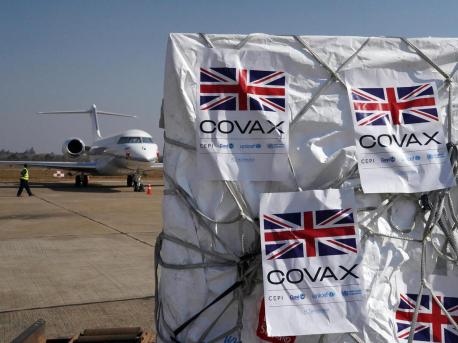
As Omicron Spreads, Africa Needs COVID-19 Vaccines. COVAX Is the Key.
Nearly 4.3 billion people have received at least one dose of COVID-19 vaccine, equal to over half the world's population. While many rich countries are on track to vaccinate 70 percent of their population — an important step toward stopping the spread of the coronavirus — just 6 percent of Africans are fully vaccinated.
Africa cannot wait. More COVID-19 vaccine doses are needed immediately
High-income nations have pledged to donate more than a billion COVID-19 vaccine doses by the end of 2021, and hundreds of millions more in 2022. As of November 29, the U.S. has shipped 271,407,320 doses to countries around the world, the majority through the COVAX dose-sharing mechanism. But much more needs to be done. Africa cannot wait. More doses are needed immediately.
Without access to vaccines, more people in Africa will die needlessly — including aid workers — and the virus will spread unchecked, potentially creating more variants like Omicron. Now affecting countries in Africa with fragile health care systems, Omicron has received “variant of concern” designation from WHO.
With Omicron taking hold, the need for COVID-19 vaccines is more urgent than ever
According to WHO, preliminary evidence suggests Omicron may carry a higher risk of reinfection than other variants of concern. That danger underscores the necessity of every country gaining equal access to the tools to fight COVID, slow down transmission and curb its spread – tests, treatments, infection control equipment and of course, lifesaving vaccines.
"UNICEF has not been spared," said Gabriele Fontana, UNICEF Eastern and Southern Africa Regional Advisor for Health. "We are losing colleagues, losing relatives ... And then you look at our region where we have 2 percent of people vaccinated, and we are still struggling to secure vaccines. And that’s a huge inequity.”
"... Look at our region where we have 2 percent of people vaccinated, and we are struggling to secure vaccines. That's a huge inequity."
COVID-19 vaccines save lives. They're the surest way out of the pandemic — it's essential that everyone has access to them. That's why UNICEF is a key partner in COVAX, the global alliance formed to ensure all countries, particularly the most vulnerable, get their fair share of vaccines. The COVAX Facility has shipped more than 428 million doses to 144 countries, and is on track to make available more than a billion doses for the world's 92 lowest-income countries by the end of the year — including 470 million doses to Africa.
UNICEF is calling on G20 leaders to donate COVID-19 vaccine doses to Africa now
When world leaders met for the G20 Summit in Rome, UNICEF called on wealthy nations to donate COVID-19 vaccine doses by December, along with resources to turn vaccines into vaccinations — to train health care workers and equip them with personal protection equipment, and the infrastructure to store and transport vaccines.
“Vaccine inequity is not just holding the poorest countries back — it is holding the world back,” said UNICEF Executive Director Henrietta Fore. “As leaders meet to set priorities for the next phase of the COVID-19 response, it is vital they remember that, in the COVID vaccine race, we either win together, or we lose together."
As part of COVAX, UNICEF is working around the clock to help end the pandemic, providing logistical support for vaccine distribution worldwide. Please donate.
Top photo: On August 13, 119,360 Astra-Zeneca COVID-19 vaccine doses donated by the U.K. government through the COVAX Facility arrived in Kenneth Kaunda International Airport in Lusaka, Zambia. COVAX is a global alliance founded to facilitate the equitable distribution of COVID-19 vaccines worldwide. © UNICEF/UN0502290/James. Video by Tong Su for UNICEF USA
HOW TO HELP
There are many ways to make a difference
War, famine, poverty, natural disasters — threats to the world's children keep coming. But UNICEF won't stop working to keep children healthy and safe.
UNICEF works in over 190 countries and territories — more places than any other children's organization. UNICEF has the world's largest humanitarian warehouse and, when disaster strikes, can get supplies almost anywhere within 72 hours. Constantly innovating, always advocating for a better world for children, UNICEF works to ensure that every child can grow up healthy, educated, protected and respected.
Would you like to help give all children the opportunity to reach their full potential? There are many ways to get involved.





